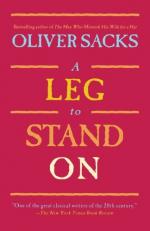
|
Preface and Acknowledgements
1. Who has written about the "occasions of poetry" (pg 9)?
(a) Admiral Nelson.
(b) T. S. Eliot.
(c) William Shakespeare.
(d) Thomas Gunn.
2. What analogy does Sacks refer to as he draws the relationship between science and art?
(a) Newton's apple.
(b) Einstein's theory of relativity.
(c) Archimedes' bathtub.
(d) Galileo's earth.
3. What was the occasion for this book?
(a) The study of an unusual patient.
(b) An accident with expected effects.
(c) An accident with peculiar effects.
(d) Reading a book about an unusual patient.
4. Where did Sacks's accident occur?
(a) In the Swiss Alps.
(b) On a mountain in Norway.
(c) On a mountain in Finland.
(d) In the hills of Germany.
5. What did Sacks find astonishing about his wound?
(a) The inability of his doctors to understand him.
(b) The long recovery time.
(c) The pain he felt during his whole recovery.
(d) The complexity of effects he experienced during recovery.
6. Since his accident, what has Sacks been aware of?
(a) The shallowness of everyday life.
(b) The wonder and horror which are an everyday part of life.
(c) The wonder and horror which lie just behind life.
(d) The shallowness of human experience.
(read all 180 Multiple Choice Questions and Answers)
|
This section contains 5,777 words (approx. 20 pages at 300 words per page) |

|




